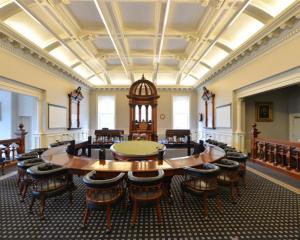It has, without doubt, been a good year for the Dunedin City Council-owned companies. And that is good news for the city.
But while acknowledging that fact, it is important not to get carried away with the figures promoted when the holding company and the other company results were released last week.
Highlighted is the group posting a $20.5 million profit (after tax), compared with a loss of $5.1 million the year before.
Underlying performance, while still positive, is not so spectacular. Excluding forest revaluation, carbon credit revenue, asset impairments and subvention payments, the group's net profits for the last financial year were up $4.4 million on the previous year to $11.5 million.
The company boards have been restructured, and this and new governance leadership has been given much credit for the turnaround.
Although there would appear to be improvements, these can be overstated in the aftermath of change. The previous loss owed much to writing off massive amounts for the failure of Delta Investments, part of Delta, in the failed land development projects at Luggate and Jacks Point, near Queenstown.
Delta Investments has now cut and run from Luggate, and it busy trying to sell off Jacks Point land.
City Forests passed off the running of its sawmill near Milton, the plant that has never made good money and which was in part built, one suspects, because of underlying political pressure to add value to logs.
Delta, meanwhile, after sustaining heavy losses, has escaped from Christchurch. The competition was too much. It also closed its Dunedin water and civil business, although the closures themselves came after the end of the financial year.
Delta has had grandiose plans as an infrastructure company but is now facing reality.
Among other contracts lost is the 3 waters services to the Central Otago District Council, which it had run for 10 years. The fact that it lists 55 employers earning salaries and benefits of more than $100,000 indicates a company with high-cost structures.
It is still making good money on long-term contracts, particularly with council-owned Aurora, but will have to be on its mettle.
City Forests, for years the ugly duckling, the company widely favoured for the asset-sale chopping block because of low rates of returns, has benefited from good log prices.
Its revenue line reads $48,443,000, but the last of its major carbon credit sales brought in more than $6 million and the forests were revalued $7 million upwards. Subtract those figures, and the before-tax profit comes down to about $6 million, a reasonable but not spectacular return on assets of more than $100 million.
It now has to be very careful salaries and costs are kept in check during these relatively good times because they will not last forever.
There are nothing like monopolies for making money, and lines company Aurora raked in the cash, with a trading profit before cash of $19 million.
Meanwhile, half-owned Dunedin International Airport Ltd managed a surplus before tax of $3.2 million. Aeronautical revenue brought in 37.9% of its income and non-aeronautical 57%.
The council-owned companies might struggle in areas of genuine competition - witness Delta and the previous sale of loss-making Citibus - but overall they remain extremely valuable to the city of Dunedin and its ratepayers.
This is especially so when city ''venues'', including the stadium, suck up cash, and when there are whopping debts to service and pay back.
Even allowing for the way the facts and figures are highlighted by Dunedin City Holdings and its companies, the results are pleasing, especially now council companies are no longer borrowing to pay dividends.
Dunedin residents must now hope 2013-14 continues in similar vein, even with some of the one-off gains disappearing.
Crucially, the outlook for log prices is still good and Aurora remain a steady and healthy earner.












